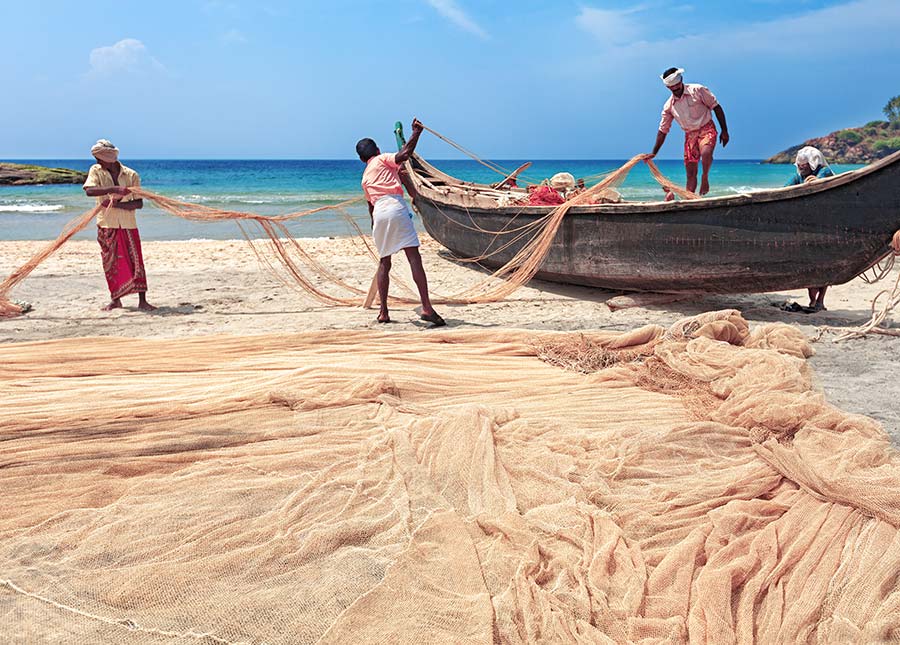Rogue Indian fishermen “threaten” Sri Lanka’s economic future
In 2024, a record number of Indian fishermen were arrested, over 500 in one year. The problem has grown since the end of the internal conflict in 2009. The people of the north, already scarred by war, are paying the price. Calls for the application of international standards in the sector.
Colombo (AsiaNews) - A serious security challenge looms over the island's future: the ongoing practice of illegal, unregulated and unreported (IUU) fishing by Indian vessels in Sri Lanka's internal waters.
The problem, which has grown exponentially since the end of the internal conflict in 2009, has devastated the livelihoods of the country's fishing communities, particularly those in the north already ravaged by war.
One figure in particular serves to illustrate the scale of the emergency: for the first time in a decade, in 2024, the number of Indian fishermen arrested in Sri Lanka exceeded 500.
The fishing dispute between Sri Lanka and India remains a complex diplomatic challenge, with New Delhi's promises of cooperation often clashing with the reality on the ground, including political obstacles in Tamil Nadu, where the issue remains a sensitive election issue.
According to George I. H. Cooke, executive director of the Regional Centre for Strategic Studies (Rcss), “Indian fish traders are depriving the (Tamil) fishing community in Sri Lanka, particularly in the north, of its economic sovereignty”.
‘The fishing issue,’ the expert continues, ‘is long-standing and has not been addressed effectively. Indian traders and large fishing companies use large fishing vessels. The island nation's industry faces a number of challenges, including overfishing, illegal, unreported and unregulated fishing, and the depletion of raw materials.’
‘These long-standing issues,’ he warns, ‘threaten the livelihoods of more than 2.5 million coastal residents and have an impact on the country's economy and food security.’
Fish accounts for 50% of Sri Lanka's animal protein consumption, confirming the sector's crucial role in ensuring food security.
The industry has enormous potential to increase sources of income, improve available stocks and gain market recognition.
Despite its vast aquatic resources, the domestic sector has faced numerous challenges, from the lingering effects of conflict to overfishing and the effects of climate change.
Meanwhile, the International Labour Organisation (ILO) is promoting inclusive and decent work opportunities, supporting the Colombo government's path towards ratification of the 2007 Work in Fishing Convention (No. 188).
With assistance from the Australian Government's Department of Foreign Affairs and Trade (DFAT) and the Norwegian Government, the ILO has conducted field consultations across the island with fishers, boat owners, fishers' families and other stakeholders, while helping institutions develop a roadmap towards ratification of the Work in Fishing Convention.
The benefits of ratifying C188 will include improved working conditions and social security, an improved image for the sector and greater competitiveness in the global market.
Environmentalists Chirantha Alwis and Sashikala Tennakoon explain to AsiaNews that "although Sri Lankan laws prohibit trawling and illegal fishing by foreign vessels, Indian fishing boats continue to sail illegally in northern waters without facing legal consequences for the violation. If Sri Lanka continues to back down on enforcing the laws introduced to end destructive trawling, the communities in the north and north-east will find themselves with declining fish stocks, including a food security crisis," the scholars warn.
According to senior Navy officials, 'at the heart of the dispute between Sri Lanka and India is the destructive practice of trawling by Indian fishermen, mainly from Tamil Nadu, who regularly cross the International Maritime Boundary Line (IMBL).
This method involves dragging heavy nets along the ocean floor, devastating marine ecosystems, destroying coral reefs and seabed habitats.
Gradually, the seabed is being systematically destroyed. Although only a small group of Indian fishermen continue this illegal activity, the environmental and economic consequences for Sri Lanka are serious.
The fishermen suffer recurring losses, they conclude, including destroyed nets, damaged boats and declining catches due to collisions with larger Indian fishing vessels, as the latter are mostly equipped with steel hulls and technologically advanced.







.png)










